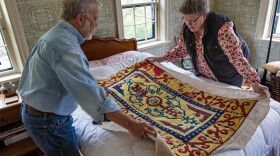Martha Bebinger
[Copyright 2024 NPR]
-
An innovative pilot project uses emailed "heat alerts" to inform doctors and nurses of dangerous local temperatures, so they can advise patients who are most vulnerable to heat-related illness.
-
The medical dangers of heat are real. But people often ignore public heat alerts, or don't know how vulnerable they are. A new alert system prompts clinicians to talk about heat with patients.
-
It can be heartbreaking to let go of a hand-made rug or sweater that a loved one didn't quite finish. A group of volunteer knitters, quilters and other crafters offer some closure.
-
Dedicated crafters often leave projects unfinished when they die. Now, there's a group that pairs those half-knitted hats and partly-stitched quilts with new crafters who can finish them for families.
-
Ten years ago, these first responders were strangers. Thrown together to save lives at the finish of the Boston Marathon, they became a family.
-
Federal restrictions seemed to explain why many doctors weren't prescribing medication for opioid addiction. But some caution that removing those rules isn't enough to overcome hesitancy and stigma.
-
At many U.S. hospitals, children and teens are stuck in the emergency department for days or weeks because psychiatric beds are full. Massachussets has a simple, yet promising solution.
-
A small study shows pharmacists could play a key role in getting addiction medication directly into the hands of more people who need it. (Story aired on All Things Considered on Jan. 11, 2023.)
-
A small study shows pharmacists could play a key role in getting addiction medication directly into the hands of more people who need it, but there are a lot of barriers to expanding the project.
-
Drug overdose deaths among teens and young adults have nearly doubled since 2019. There's concern that counterfeit pills, laced with fentanyl, sold via social media sites, are partly to blame.




